Occupy Central
Occupy Central is a civil disobedience movement which began in Hong Kong on September 28, 2014. It calls on thousands of protesters to block roads and paralyse Hong Kong's financial district if the Beijing and Hong Kong governments do not agree to implement universal suffrage for the chief executive election in 2017 and the Legislative Council elections in 2020 according to "international standards." The movement was initiated by Benny Tai Yiu-ting, an associate professor of law at the University of Hong Kong, in January 2013.
OCCUPY CENTRAL - DAY 41: Full coverage of the day’s events
PUBLISHED : Friday, 07 November, 2014, 5:05am
UPDATED : Friday, 07 November, 2014, 5:05am
Hong Kong students don't deserve seats on chief executive nominating committee
Regina Ip proposes giving seats on nominating committee to students
There is at least one thing in Regina Ip Lau Suk-yee's proposal about redistributing seats in the future nominating committee that most people would like.
This involves reducing the absurdly high number of seats - 60 out of 1,200 - that the agriculture and fisheries subsector has been assigned under the old election committee. But beyond that, it's not clear why we should give protesting students seats on the nominating committee which will pick candidates for the 2017 chief executive election.
The idea from the chairwoman of the New People's Party seems to be driven wholly by a need to address the political demands of the Occupy protesters. But there is a problem. First, the leaders of the Federation of Students don't recognise the nominating committee, which as far as they are concerned will have zero legitimacy. That's why they are in the streets in the first place, to fight for what they call civil nomination, which would either neuter or replace such a committee. It goes without saying they don't want any seat on what they consider an illegitimate and democratically unrepresentative body.
Second, it's not clear who and what the federation represents. It appears their power base primarily rests in Admiralty but has limited influence in Causeway Bay and Mong Kok. Neither the student leaders nor anyone else could really claim to represent or speak for the "umbrella" movement. So far, the students have been fighting for what they call "real" universal suffrage. Would they represent the pan-democrats in the newly reassigned seats in the nominating committee? Would not other pan-democratic groups with a longer history and better organisation deserve those seats?
Now Ip seems to argue the federation could represent young people. But as far as I know, the student leaders have never really tackled youth issues such as education, lack of employment, poor housing prospects, social mobility and economic opportunity. Far more qualified social workers, economists and even political parties have pondered and worked on such issues.
So while we should welcome new ideas at a time when nobody seems to have any good ideas for overcoming the Occupy impasse, Ip's proposal is not workable.
This article appeared in the South China Morning Post print edition as Students don't deserve committee seats
Occupy sites the front line for a generation that got ripped off
Protests are really about young people raging against a system that has made them serfs
PUBLISHED : Friday, 07 November, 2014, 6:30am
What the Occupy Hong Kong movement has revealed isn't how much the protesters love democracy, but how much they hate the status quo.
The Occupy Hong Kong movement has been with us for some time now. What came as a revelation isn't how much the protesters love democracy, but how much they hate the status quo.
You can tell by their impossible demands and intransigence that the last thing they want is for things to return to normal. It's apparent that they consider themselves not only fighters for democracy, but also victims of the oppression and tyranny of the status quo.
Many people didn't see it coming, for the protesters had kept their anger and frustration mostly to themselves until they became galvanised and emboldened by the movement. The American writer Henry David Thoreau said most people lead lives of quiet desperation. Many of the protesters would certainly agree.
There's a lesson to be learnt here. Public discontent may lie dormant for years, but it should never be considered extinct. The price of good governance, like the price of freedom, is eternal vigilance.
It's a sign of how complacent and out of touch the government had been that it seemed to be caught unprepared for the volcanic eruption of dissatisfaction and hostility unleashed by the movement.
Without exaggeration, the Occupy movement is a generational war. The so-called Occupy Generation, whose members are mostly students and young workers born during and since the 1980s, believe that they are fighting for a better future for themselves, and they never tire of reminding the media and their detractors that time is on their side.
They obviously feel no qualms about making life inconvenient, even difficult, for others in their fight for a better Hong Kong. Collateral damage, apparently, is nothing to lose sleep over.
This may sound heartless but it has always been the privilege of young people to exhibit little compassion, empathy or concern for anyone's interests but their own.
In The Other America, American political scientist Michael Harrington writes that poor people are poor because they made the mistake of being born to the wrong parents. In Hong Kong, many young people are dispossessed because they made the mistake of being born in the wrong age. They've missed the age when property prices were still affordable by those who were determined and hard-working enough.
Those good old days are long gone. Through no fault of their own, today's youth are condemned to a lifetime of servitude imposed by a runaway property market. Living in a society in which the value of everything is largely determined by its sale price, they feel deprived and disadvantaged if not downright poor.
If war is too important to be left to generals, changing the world is too important to be left to the young and the restless.
But these young men and women wouldn't be playing havoc with law and order if they had not been let down by adult society.
It is said that if you don't like how the table is set, turn the table. This is exactly what they are doing.
Perry Lam is a local cultural critic
This article appeared in the South China Morning Post print edition as Occupy sites the front line for generation that got ripped off
Police donation fund 'may be for legal support' of suspended officers
PUBLISHED : Friday, 07 November, 2014, 6:30am
Police Commissioner Andy Tsang Wai-hung is said to have approved the call for donations.
Two major police unions have made a call for donations to support officers whose livelihoods have been hit by the Occupy pro-democracy protests.
But one police insider suggested yesterday that the fund was in fact intended to provide legal support for seven officers suspended pending an investigation into the alleged beating of Civic Party activist Ken Tsang Kin-chiu by officers.
The Junior Police Officers' Association and the Hong Kong Police Inspectors' Association set up the welfare foundation with the blessing of the police commissioner. They are seeking contributions from members and other officers until November 20.
Chan Cho-kwong, chairman of the junior officers' group, said Police Commissioner Andy Tsang Wai-hung had approved the move last week. He said applicants would be assessed by a six-member panel. A decision on whether to support the officers involved in the beating allegation would rest with the panel.
"The purpose of the donation is to help those fellow officers whose families and whose own well-being have been affected by the Occupy movement," Chan said. "The most likely use of the money is to help those who are injured during the action, or to help officers requiring funds for legal assistance."
But a police source suggested the fund had really been set up partly as a legal fund for seven officers who have been suspended pending investigation into allegations they beat Tsang after his arrest. The source added: "But it would be politically difficult to be seen to do it for that purpose."
This article appeared in the South China Morning Post print edition as Police donation fund 'may be for legal support'
Most Hong Kong people want Occupy to end now, says DAB poll
Executive councillor defends survey, which some have criticised because party staff conducted it
PUBLISHED : Friday, 07 November, 2014, 6:30am
Occupy Central co-founder Benny Tai Yiu-ting (left) walks past tents at the protest site at Admiralty. Photo: AFP
Two-thirds of Hongkongers want the Occupy protests to "end immediately", an opinion poll conducted by the city's largest pro-establishment party has found.
Staff from the Democratic Alliance for the Betterment and Progress of Hong Kong personally interviewed 5,531 residents aged 12 or above last month. They also found that 77 per cent of Hongkongers agreed that police should clear the occupation sites when the time is right.
However, an activists' leader questioned the validity of the poll, which was conducted by DAB district office staff.
Daisy Chan Sin-ying, convenor of the Civil Human Rights Front, said: "According to our volunteers, some residents or business owners in the protest sites are actually sympathetic towards the Occupy movement."
She dismissed the call for protesters to leave, as Beijing had failed to retract its restrictive framework for the 2017 chief executive election.
On why the party did not commission an independent body to conduct the poll, DAB vice-chairwoman and executive councillor Starry Lee Wai-king explained that they wanted to "understand the residents' [opinion] directly".
"It isn't only the DAB which is doing this kind of poll," she added.
On Wednesday, Polytechnic University said its pollsters found nearly three-quarters of respondents felt now was the right time to stop the civil disobedience action.
Lee said based on the poll results, the DAB would urge the protesters to leave, the police to enforce the law and officials to launch the next round of public consultation on electoral reform.
Speaking in Guangzhou, Chief Executive Leung Chun-ying said: "It's not a question of when the government will clear the protest sites, but when initiators [of the movement] and participants decide to leave."
He also questioned whether it was necessary for representatives of the Federation of Students to go to Beijing to reiterate their demand for public nomination of chief executive candidates, since central government officials had repeatedly said the idea was not in line with the Basic Law.
The federation has pinned its hope on former chief executive Tung Chee-hwa and Hong Kong's representative on the National People's Congress Standing Committee, Rita Fan Hsu Lai-tai, setting up a dialogue.
This means it may defer sending a delegation to Beijing, which it had intended to do next week to coincide with the Asia-Pacific Economic Cooperation forum, until it hears from the pair.
This article appeared in the South China Morning Post print edition as Most people want Occupy to end, says DAB poll
Occupy sites the front line for a generation that got ripped off
Protests are really about young people raging against a system that has made them serfs
PUBLISHED : Friday, 07 November, 2014, 6:30am
What the Occupy Hong Kong movement has revealed isn't how much the protesters love democracy, but how much they hate the status quo.
The Occupy Hong Kong movement has been with us for some time now. What came as a revelation isn't how much the protesters love democracy, but how much they hate the status quo.
You can tell by their impossible demands and intransigence that the last thing they want is for things to return to normal. It's apparent that they consider themselves not only fighters for democracy, but also victims of the oppression and tyranny of the status quo.
Many people didn't see it coming, for the protesters had kept their anger and frustration mostly to themselves until they became galvanised and emboldened by the movement. The American writer Henry David Thoreau said most people lead lives of quiet desperation. Many of the protesters would certainly agree.
There's a lesson to be learnt here. Public discontent may lie dormant for years, but it should never be considered extinct. The price of good governance, like the price of freedom, is eternal vigilance.
It's a sign of how complacent and out of touch the government had been that it seemed to be caught unprepared for the volcanic eruption of dissatisfaction and hostility unleashed by the movement.
Without exaggeration, the Occupy movement is a generational war. The so-called Occupy Generation, whose members are mostly students and young workers born during and since the 1980s, believe that they are fighting for a better future for themselves, and they never tire of reminding the media and their detractors that time is on their side.
They obviously feel no qualms about making life inconvenient, even difficult, for others in their fight for a better Hong Kong. Collateral damage, apparently, is nothing to lose sleep over.
This may sound heartless but it has always been the privilege of young people to exhibit little compassion, empathy or concern for anyone's interests but their own.
In The Other America, American political scientist Michael Harrington writes that poor people are poor because they made the mistake of being born to the wrong parents. In Hong Kong, many young people are dispossessed because they made the mistake of being born in the wrong age. They've missed the age when property prices were still affordable by those who were determined and hard-working enough.
Those good old days are long gone. Through no fault of their own, today's youth are condemned to a lifetime of servitude imposed by a runaway property market. Living in a society in which the value of everything is largely determined by its sale price, they feel deprived and disadvantaged if not downright poor.
If war is too important to be left to generals, changing the world is too important to be left to the young and the restless.
But these young men and women wouldn't be playing havoc with law and order if they had not been let down by adult society.
It is said that if you don't like how the table is set, turn the table. This is exactly what they are doing.
Perry Lam is a local cultural critic
This article appeared in the South China Morning Post print edition as Occupy sites the front line for generation that got ripped off
Most Hongkongers want Occupy to end now, says DAB poll
Executive councillor defends survey, which some have criticised because party staff conducted it
PUBLISHED : Friday, 07 November, 2014, 6:30am
Occupy Central co-founder Benny Tai Yiu-ting (left) walks past tents at the protest site at Admiralty. Photo: AFP
Two-thirds of Hongkongers want the Occupy protests to "end immediately", an opinion poll conducted by the city's largest pro-establishment party has found.
Staff from the Democratic Alliance for the Betterment and Progress of Hong Kong personally interviewed 5,531 residents aged 12 or above last month. They also found that 77 per cent of Hongkongers agreed that police should clear the occupation sites when the time is right.
However, an activists' leader questioned the validity of the poll, which was conducted by DAB district office staff.
Daisy Chan Sin-ying, convenor of the Civil Human Rights Front, said: "According to our volunteers, some residents or business owners in the protest sites are actually sympathetic towards the Occupy movement."
She dismissed the call for protesters to leave, as Beijing had failed to retract its restrictive framework for the 2017 chief executive election.
On why the party did not commission an independent body to conduct the poll, DAB vice-chairwoman and executive councillor Starry Lee Wai-king explained that they wanted to "understand the residents' [opinion] directly".
"It isn't only the DAB which is doing this kind of poll," she added.
On Wednesday, Polytechnic University said its pollsters found nearly three-quarters of respondents felt now was the right time to stop the civil disobedience action.
Lee said based on the poll results, the DAB would urge the protesters to leave, the police to enforce the law and officials to launch the next round of public consultation on electoral reform.
Speaking in Guangzhou, Chief Executive Leung Chun-ying said: "It's not a question of when the government will clear the protest sites, but when initiators [of the movement] and participants decide to leave."
He also questioned whether it was necessary for representatives of the Federation of Students to go to Beijing to reiterate their demand for public nomination of chief executive candidates, since central government officials had repeatedly said the idea was not in line with the Basic Law.
The federation has pinned its hope on former chief executive Tung Chee-hwa and Hong Kong's representative on the National People's Congress Standing Committee, Rita Fan Hsu Lai-tai, setting up a dialogue.
This means it may defer sending a delegation to Beijing, which it had intended to do next week to coincide with the Asia-Pacific Economic Cooperation forum, until it hears from the pair.
This article appeared in the South China Morning Post print edition as Most people want Occupy to end, says DAB poll
Government must build paths for real engagement
Stephen Vines fears consequences of alarmist talk about Occupy protests
PUBLISHED : Friday, 07 November, 2014, 1:00pm
There are alternatives to the current system of mutant democracy and command from a remote leadership. They require trust in the people of Hong Kong. Photo: AP
The time has come to start thinking beyond the present crisis in Hong Kong, as it is now crystal clear that we cannot simply go back to where we were.
Right now, the anti-democrats are doing most of the talking about the future but are doing so in irresponsible terms, warning of the long-term damage likely to be inflicted by the umbrella movement. This alarmist talk is dangerous; not least because it might be self-fulfilling, most tragically if a decision is taken to violently suppress the movement. Demonising those who dare to protest makes it easier to justify a bloody response, and it precludes the dialogue that is required to defuse the situation.
Were a real dialogue to take place, the anti-democrats might be able to appreciate the quality of their interlocutors. Anyone who has bothered to talk to the protesters knows that most of them keenly appreciate Hong Kong's realities. They realise that democracy will not be achieved any time soon and that challenging the might of the Chinese state is an unequal battle. Yet this is not producing fatalism but an understanding that they are involved in a long-term struggle demanding sacrifice.
While they are thinking about what this entails, they are bombarded by suggestions that demonstrate a poverty of understanding. The younger generation is urged to simply return to their studies and wait until they are older before engaging in politics. Some suggest they should get involved in political parties, while others say they should spend their time focusing on pragmatic day-to-day issues and abandon idealism.
In other words, they are being urged to either shut up or look to older models of achieving change that have produced precisely the frustration that led to the current protests.
The diehard anti-democrats simply refuse to appreciate the value of the creativity and civic-mindedness of a generation who have been dismissed elsewhere in this newspaper as mere children. These "children" are displaying an enormous wealth of talent and have demonstrated impressive levels of maturity that explain why they have so much support from all levels of society.
The question remains how to use their talent and commitment. Obviously, a move towards genuine democratic government would produce meaningful participation in society. We know this will be strenuously resisted by those currently holding power, but there are modest steps that can be taken.
The establishment can help itself and defuse some of the anger directed against it by building structures outside the confines of those that characterise public life in Hong Kong. As matters stand, public consultation exercises tend to be farcical, advisory bodes are largely packed with pro-establishment figures and the limited dialogue with opposition personalities tends to be stilted and non-productive.
It requires both imagination and willingness to think anew about how a new level of engagement can be achieved. The alternative is prolonged disruption and stalemate.
The established order probably believes it can get away without change and has formidable resources to sustain itself; plus, it has the backing of a dictatorship. However, as Mao Zedong famously observed, what looks like great power often turns out to be no more than paper tigers.
There are alternatives to the current system of mutant democracy and command from a remote leadership. These alternatives require a great deal more trust in the people of Hong Kong.
The problem is that the proponents of the status quo speak proudly about their patriotism and love of Hong Kong but, in truth, believe that its people are somehow inferior.
Stephen Vines is a Hong Kong-based journalist and entrepreneur
This article appeared in the South China Morning Post print edition as Government must build paths for real engagement
Occupy Central threatens ‘Hong Kong security’, Beijing advisers warn
PUBLISHED : Friday, 07 November, 2014, 3:03pm
Occupy Central "has some elements of a ‘colour revolution’ and has already threatened ‘Hong Kong security’,” the two academics wrote. Photo: K.Y. Cheng
Two mainland academics who advise Beijing on Hong Kong affairs have warned that Occupy Central protests have threatened “Hong Kong security”, which is a crucial determinant of national security.
The new jargon was invented by Huang Ping, vice-chairman of the Chinese Association of Hong Kong and Macau Studies, and Chen Xinxin, a legal affairs expert at the Chinese Academy of Social Sciences, in an article published in the latest issue of the Hong Kong and Macao Journal.
The association, chaired by former deputy director of the Hong Kong and Macau Affairs Office, Chen Zuoer, is a high-level think tank set up by the central government last year to study Hong Kong affairs, including the Basic Law and political reform.
In the article entitled “The Unlawful Nature of the Occupy Central campaign in Hong Kong”, Huang and Chen said the protests, which have paralysed parts of the city for six weeks, had upset social order and undermined the foundation of the rule of law.
“It also has some elements of a ‘colour revolution’ and has already threatened ‘Hong Kong security’,” the two academics wrote.
The Occupy movement was labelled by Vice-Premier Wang Yang last month as a “colour revolution”, a reference to uprisings in post-Soviet states.
“Hong Kong security is a crucial determinant of national security of China, which is Hong Kong’s sovereign country,” they wrote.
The academics argued that the Basic Law had put forward the concept of “security of the Hong Kong special administrative region”.
They cited Article 18 of the Basic Law. It states that the central government may issue an order applying the relevant national laws in Hong Kong in the event that the National People’s Congress Standing Committee decides to declare a state of war.
Article 18 also states that the central government can apply national laws in the city if it decides there is a state of emergency caused by turmoil within Hong Kong which endangers national unity or security and is beyond the control of the special administrative region government.
“It shows the drafters of the Basic Law expected the chief executive to put Hong Kong security as the most important consideration in discharging his or her duty,” the academics wrote. “The chief executive and Hong Kong police must take into account this concept when they tackle unlawful occupation activities.”
Political commentator Johnny Lau Yui-siu, who covered the drafting process of the Basic Law in the 1980s as a journalist, said that compared with constitutional development, the concept of national security, let alone “Hong Kong security”, was not the focus of discussion among drafters at the time.
“The two academics simply invented a new term to serve the political needs of targeting Occupy Central,” he said.
Lau said there was no need to panic about the idea of “Hong Kong security” floated by the academics. “I understand that Beijing won’t send the People’s Liberation Army to the streets in Hong Kong unless there is serious looting and disturbances,” he said.
This article appeared in the South China Morning Post print edition as Two Beijing advisers launch jargon attack on Occupy ‘security threat’
Occupy protests breaking law, but not undermining Hong Kong's rule of law
Michael C. Davis says while Occupy protesters are clearly breaking the law, they are arguably not undermining the rule of law through their peaceful civil disobedience campaign
PUBLISHED : Friday, 07 November, 2014, 5:02pm
The case for civil disobedience not undermining the rule of law may be especially high when the civil disobedience itself is non-violent and reasonably confined.
A small group of lawyers has added to the chorus of establishment figures denouncing the Occupy movement as undermining the rule of law. Are they right?
As the protests stretch well into their second month, we are hearing increasing calls for them to end. Some of these are calls of prudence, suggesting withdrawal and alternative strategies to promote the protesters' cause. On the other side, officials and now a small group of establishment lawyers have accused protesters engaged in civil disobedience of undermining the rule of law.
Do protesters using civil disobedience to promote democracy and better secure Hong Kong's core values pose the risks to the rule of law that officials and pro-government lawyers claim?
It is important here to distinguish between breaking the law and undermining the rule of law. The non-violent protesters have clearly broken the law by not complying with the Public Order Ordinance and, further, by not clearing those areas covered by court orders. Both are purposeful law-breaking in furtherance of a non-violent civil disobedience campaign. We should bear in mind that civil disobedience by definition involves breaking the law in support of a higher ideal that is the aim of the civil disobedience campaign.
Some argue that the anti-Occupy demonstrators who physically attack protest sites are comparable, but these attacks appear to have been neither civil disobedience nor non-violent. Clearly, the scales shift heavily against any protesters on the street employing violence and the police would be duty-bound to protect other protesters from such violent attacks.
The police also have a duty to investigate fully the widely publicised alleged attack by a group of officers on an already subdued and handcuffed protester.
Rampant law-breaking in a society may sometimes contribute to undermining the rule of law, in that it may create a situation of distrust towards lawful authority, degrading general adherence to the law. Examples might include rampant corruption, cronyism or high levels of violent crime and lawlessness.
But not all law-breaking effectively undermines the rule of law. The case for civil disobedience not doing so may be especially high when the civil disobedience itself is non-violent and reasonably confined, and is a protest against the government undermining democracy or the rule of law.
A more direct threat to the rule of law typically comes from government. As the term "rule of law" suggests, the ruler may more readily put the rule of law in jeopardy. The commitment of the rule of law is that nobody is above the law and everyone is subject to the law applied in the ordinary manner. Further definitional refinement may include notions of justice, adherence to human rights and so on.
The white paper and the National People's Congress Standing Committee decision call the government's adherence to basic principles of the rule of law into question. The white paper, claiming that sole authority over the Basic Law resides in the central government and comprehensive jurisdiction in the NPC Standing Committee, appears to abandon Hong Kong's internationally guaranteed "high degree of autonomy" and put the Standing Committee above the law.
Why should the Basic Law make distinctions between matters of central authority and matters of autonomy if all are matters of central authority? The Standing Committee decision makes mincemeat of the promised "universal suffrage", thus further degrading the human rights guarantees in the Basic Law.
By putting the Standing Committee above the law and redefining basic human rights guarantees in an unrecognisable manner, the State Council and the Standing Committee have put Hong Kong's high degree of autonomy and rule of law in jeopardy. The failure of the local government to guard Hong Kong's high degree of autonomy and its seemingly complicit role in the Standing Committee's decision implicates it as well.
The pro-democracy civil disobedience campaign aims to correct this situation by putting in place a government that will better represent Hong Kong people. Such a government may be more responsive to local concerns and better guard Hong Kong's high level of autonomy. Beijing and Hong Kong officials might be persuaded that such a circumstance may be more favourable in an open society such as Hong Kong than the contentious situation their policies now encourage.
Even the Hong Kong Bar Association recently acknowledged that there is a division of opinion among jurists over the legitimacy of civil disobedience strategies that aim to support such basic human rights. Judges may sometimes be reluctant to strictly enforce laws against such non-violent protests due to regard for competing free speech concerns. Academic debates on this have identified the lack of democracy as one of the conditions generally thought to support a degree of legitimacy for civil disobedience.
So, overall, there is a good case to argue that the two recent Beijing decisions and related policies present a greater threat to the rule of law than does the civil disobedience campaign. Is either one desirable? Of course not. But when protests are a product of poorly considered government policies, the way out is for the government to change the policies.
If pro-government lawyers and politicians want to do a special service for our community, they could accomplish much more by using their access to Beijing and Hong Kong government leaders to better convey the concerns so eloquently raised by Hong Kong's young people.
As a professor who teaches our young people about the foundations of our legal system, I have been amazed at how clearly our youth, even at the secondary school level, have appreciated the risks the recent Beijing white paper and the Standing Committee decision entail.
In this context, leadership by those in government, or if not, by those close to the government or Beijing, will be crucial to turn around the failed policies and better represent Hong Kong concerns. The lack of such leadership vision explains a lot about the current impasse and threats to Hong Kong's rule of law.
Professor Michael C. Davis, of the University of Hong Kong, specialises in constitutional law and human rights
This article appeared in the South China Morning Post print edition as Clear distinction
http://www.scmp.com/topics/occupy-central

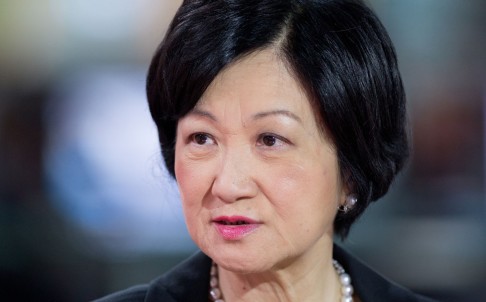
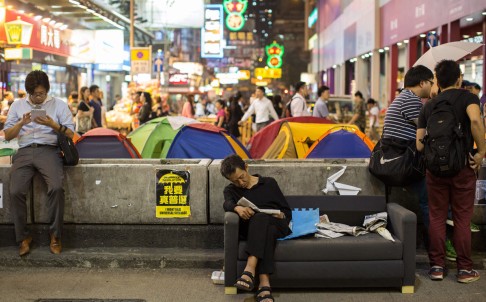
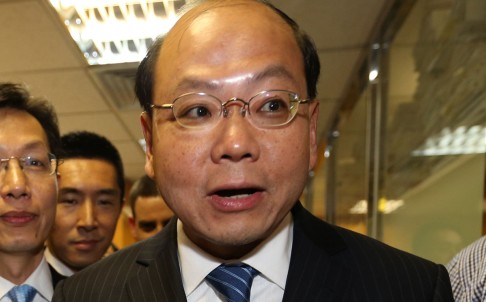
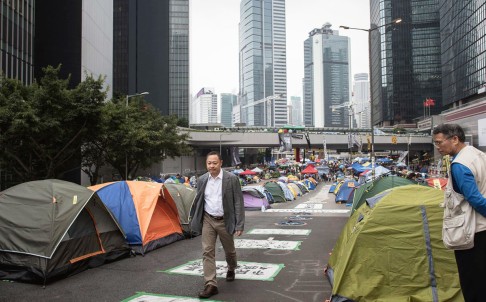
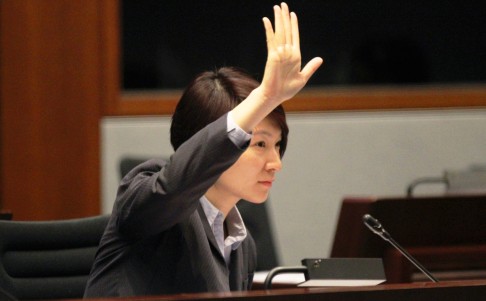
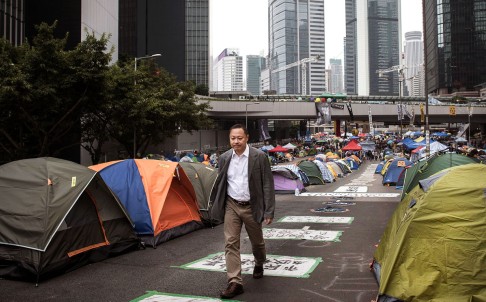
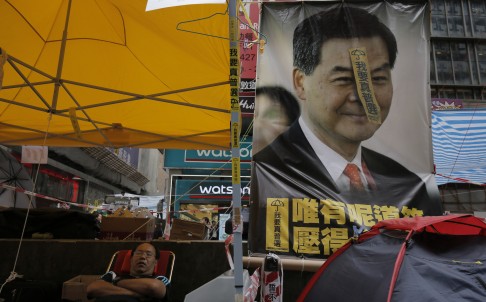
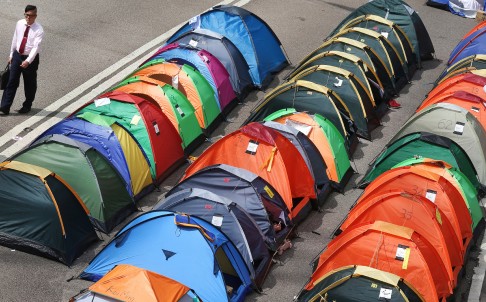
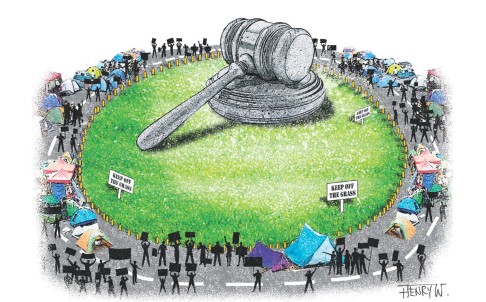
沒有留言:
張貼留言